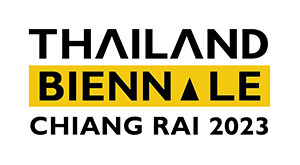The Open World
December 9, 2023–April 30, 2024
The first edition of Thailand Biennale was initiated by the Office of Contemporary Art and Culture, Thailand’s Ministry of Culture in Krabi in 2018, followed by Korat in 2021. By alternating the locations from various provinces throughout the country, the spirit of the Thailand Biennale decentralizes artistic activities, highlights site specificity, and revitalizes local relics. In December 2023, Thailand Biennale is returning for its third edition in Chiang Rai, the northernmost part of Thailand, with Rirkrit Tiravanija and Gridthiya Gaweewong as Artistic Directors and Angkrit Ajchariyasophon and Manuporn Luengaram as Curators.
Situated between Mae Kok and Mekong River, Chiang Rai has had a long and complex history stretching back to at least the thirteenth century. The curatorial team embraces this historical context as a departure point and emphasizes Chiang Rai’s rich cultural heritage to explore the many facets of this vibrant and contemporary region that manifests the importance of the past. The power of multicultural exchange can orient the current global community. Chiang Rai has undergone numerous changes over the centuries and has been shaped by many different civilizational flows due to its strategic position as an intersection of intra-Asian connectivity. Its transformation from the center of an ancient kingdom to an outpost town, and a modern border city symbolizes how societies throughout the world have changed with the passage of time.
Titled The Open World, the theme takes its name from the Buddha image enshrined in Wat Pa Sak, one of the most important ancient sites in Chiang Rai. The posture represents wisdom and awakening as Lord Buddha descends from Tavatimsa Heaven to perform a miracle of revelation. With his power, he opens the three worlds—the god world, the underworld, and the human world so that they can see one another.
Likewise, Thailand Biennale 2023 aims to “open up” people’s world and their perceptions of art using references to local history, and to engage with contemporary global issues. Simultaneously, the term Open World responds to the current world situation in the post-globalization era, where a borderless world that began after the Cold War era caused the mass migration of people and transnational capital. However, everything started to stall during the COVID-19 pandemic following the closures of international borders.
The Open World will be the departure point for participating artists to manifest the entanglements of traditions, mythology, animism, geopolitics, and ecology, as well as art and craft history, and question how we can imagine the possibility of a better future again.
We will explore the micro-histories using the context of Chiang Rai as a starting point for building dialogue with neighboring countries and the world through local-to-local connections. We will question our belief systems, from the times of the ancient state with animism and the Anthropocene by exploring the geopolitical-related ecosystems of the region. We invite artists and viewers to consider the following questions: How do we deal with the complex history of the city, especially small border towns that continually become contested areas? How can we move forward after it has undergone centuries of transformation under various influences? Can we shift perspectives that focus on nation/state and local centric to those that cross local and global perspectives? How can we share resources within the community and expand them to the region and beyond? Can we imagine the possibility of a better future?
Thailand Biennale, Chiang Rai 2023 will spread across many sites in Chiang Rai and Chiangsaen’s Golden Triangle area. It will feature artists from the Mekong to the Amazon and beyond. The first list of artists include: Busui Ajaw; all(zone); Baan Noorg Collaborative Arts and Culture; Ho Tzu Nyen; Sriwan Janehuttakarnkit; Ryusuke Kido; Michael Lin; Ernesto Neto; Nguyen Trinh Thi; Soe Yu Nwe; Nipan Oranniwesna; Roongroj Paimyossak; Sanitas Pradittasnee; Navin Rawanchaikul; Tobias Rehberger; Citra Sasmita; Kamonlak Sukchai; Apichatpong Weerasethakul; Haegue Yang; and Sawangwongse Yawnghwe.


